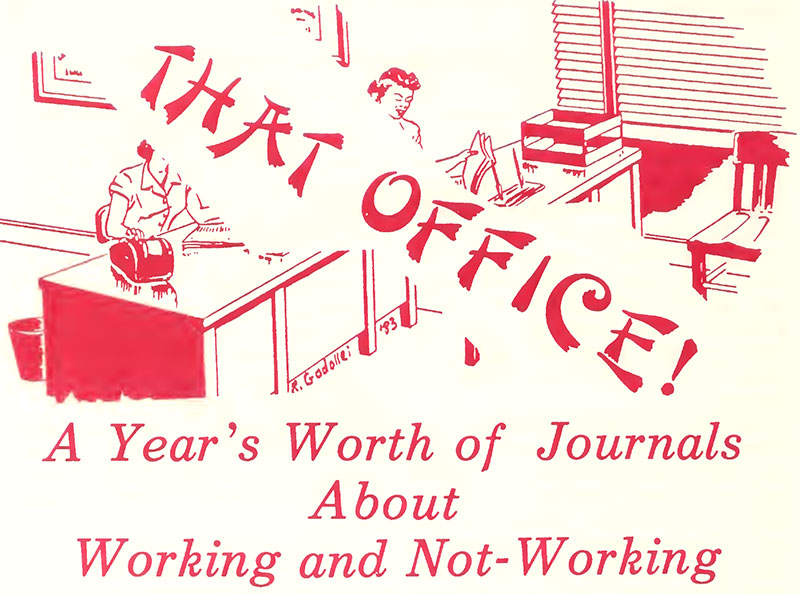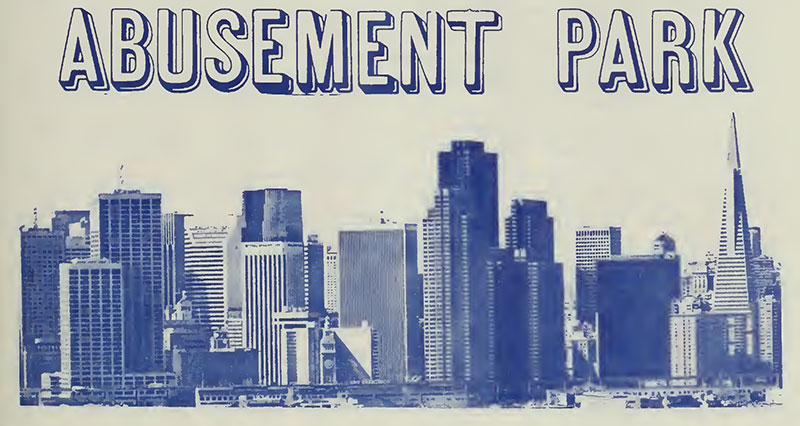That Office!: A Year's Worth of Journals About Working and Not-Working
"I was there..."
- "Foundsf.org is republishing a series of "Tales of Toil" that appeared in Processed World magazine between 1981 and 2004. As first-hand accounts of what it was like working at various jobs during those years, these accounts provide a unique view into an aspect of labor history rarely archived, or shared.
by Roberta Werdinger
—from Processed World #9, published in Winter 1984.
July 1982
Outpatient Administration
Sitting the phones is much like taking care of a baby, It demands your constant attention—you can never stray too far away without its crying out; it won't stop until you pick it up and touch it in the right places, give it what it needs (another person, a message) or else reassure the voice at the other end (as quickly as possible before another line rings) that yes, things will be all right, yes, I will tell them to call you back, no, they have not forgotten you (though often they actually have, But a good receptionist, like a good mother, is there to soothe, not instruct.)
August 1982
The Fifteen-Minute Break
It is very strange to come out of the office (you know, The Office) into a parking lot with a ledge to sit on and which (furthermore) faces onto a hill with a spread of large beautiful trees and green grass....What I mean is, looking at this world and feeling removed from it, how the World Outside and the World Inside collide and yet remain separate, I mean....
Ah, yes. That Office: sharp, efficient, phone rings and paper clips and high heels and pantyhose that itch unbearably when the cold wind blows around the legs... and yet, nature, beauty, the Unknown, somehow all the more intensified for being so rare, so removed, and yet here, as if by miracle (certainly not by purchase order) ... What I mean is, beauty invades our life in spite of ourselves, in spite of That Office, and that is the real beauty of it.
October 1982
Blissfully Unemployed
(Poor But Halfway Happy)
This great empty space of spare time has made me realize how truly dangerous it is to become lost in thought. I am now reduced to the point where I cannot read one sentence of a book without being lost for an hour or more in the infinite complications and suggestions, experiences and sensations, it evokes in me. It seems that thinking leads more and more away from action and more and more towards a world in which no action is possible, because one's thinking is never yet completed, never will be. Thinking becomes an action in itself which cancels out all other action.
And so I realize that all that we call leisure, "doing nothing," "not working," "being unemployed," all that goes through us when we stare blankly into space, actually betrays activity so intense and far-reaching that it could overturn our whole lives. The more I indulge in this activity which is no activity, the more useless and trivial the rest of life begins to seem. That, of course, is why this kind of leisure is forbidden to us— through the economic necessity of "work"—and why TV, bridge games, and typing pools (which never fail to evoke and image of drowning) were all invented. In other words, society is terrified at the prospect that we might stop working and start thinking.
March 1983
Back-To-Work
(Wherein I Leave the Swelling Ranks of the Unemployed and Re-join the Rank Swells of the Employed)
"Pulling yourself together" (which I am attempting to do now) is after all the opposite of spreading yourself out, laying thin and still, listening to the atmosphere, to the clouds condense, feeling the air pressure build....
I can feel acutely, now, the shift in consciousness when I occupy myself with work—instead of being filled with the world, immobile, I am sharpened, focused, bounded. It's the difference between thinking poetry and writing it—this involves also the unfortunate narrowing-down, just as we have to narrow our mouths to get the words out...to be open-mouthed is to be awe-struck, speechless and full of wonder, or simply retarded, or perhaps all of these at once (and it certainly means being out of a job. Clerical workers must always keep their mouths shut.)
July 1983
At the "Office of Development" at UC Med Center, A "Very Well-Run Office"
Ultimately, the fault of the office—an especially the well-run office—is that it organizes life in a way. refuses to be organized—or, rather, that the life-outside-of-the-office (the Sutro Forest above the buildings) refuses to be organized. It creates an illusion of order where none in fact exists—and then, when the rest of life does not follow form, we are lost and betrayed. Therefrom (whence, thereto, leading out of) lies the obvious liberating solution: which is—(but I forgot, the phone rang.)


